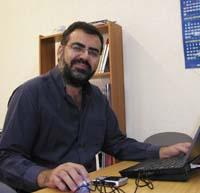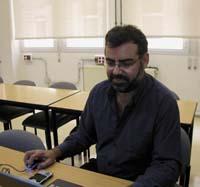Ricardo Baeza-Yates: "We analyze the interaction between Yahoo users! and all the websites"

This is the first work in which the statistical analysis is carried out, but the objective is not only that. The main objective is to collect data from people's behavior to improve future searches or to find other uses that may be of interest. Somehow, we use the inner wisdom of people's behavior, so that those same people can do better searches in the future.
The only thing that changes is how people look for, what words they use, and what language they do. Otherwise, users from one place or another look for similar things; they ask for similar things to the Internet. In that we are not so different.
Yes, of course, the trend is to increase the number of search languages. What happens is that we are doing it little by little, starting with languages with more speakers. Now searches can be done on Yahoo! in languages around 10 million speakers, and not yet.

The Basque language has approximately one million speakers, so we have not yet come to offer the possibility to search only in that language. But we will arrive sooner or later.
The problem is not that the information is objective or subjective, but that it is true or not, and this is directly related to the person who has written it or to the entity that protects it. The search engines provide all the information on the topic that we seek and try to put at the beginning the most relevant information. Each user then chooses what is worth and what is not. For example, it may happen that on an opinion page there is very interesting information and that it is worth reading it, although we do not agree with what it says. Users themselves indicate which pages are most interesting in the search conducted and search managers use this information to establish the order of the results.
Nowadays, it is true that words are searched in the searches; although a photo is searched, in the texts that accompany the photos, or in the tags that have the photos, the search engines look for the words and show the photo that appears on the page. In the future, however, it will be possible to replace a word with a photo in the search engine or search for recorded words in the videos, as well as search for information in different formats. In that we are working.

The truth is that at present there is the possibility to perform this type of searches. The problem is that they have developed very little and that they can not be used with the huge volume of information on the Internet. If we did a search of this type, we would need a lot of time to get results, it wouldn't be as fast as conventional searches, and people are used to that normal speed, don't accept to wait. However, I think that such searches will never become as fast as those of words.
In all of Yahoo!Research -- in the centers in the United States and which I direct, in Chile and Barcelona -- the main routes of analysis are based on searches. Specifically, we carry out the mining of data, that is, the obtaining of data on the structure and use of the websites, the development of technologies related to the machine learning of computers, the improvement of aspects related to the economy of the Internet - auctions, advertising, etc.- and with the experiences of the users: multimedia, interfaces, mobile, etc. That is, we analyze the interaction between all Yahoo websites! and users. We also analyze advertising to know how to get the right advertising to the right person and at the right time to meet your needs and not bother.
In addition, we have started with a new theme: We analyze how an ecosystem of people working with the Internet works. For example, Yahoo! In the service called Answers, a user asks a question and can be answered by anyone, then the one who has asked the question decides which of the answers received is the best, but anyone who reads it can give their opinion. Thus, we analyze the evolution of the websites and verify what the successes and who fail.
Two sources of information focus research. The first source of information is the products offered by Yahoo!, that is, we are looking for ways to improve the products we already have, since it is essential to improve constantly. On the other hand, we analyze the information that is extracted from all these services and products, to know what people say and think about them, to find new things and things that we do not know and that we do not expect, because with them we can create a new product, a very useful service for people.

Outside the network there are no factors that condition research, in short, our goal is to create a website capable of meeting the needs of people, which should be independent of external factors.
No, it is not possible or it is very difficult. I have been working with the Internet for twenty years; fourteen years ago I founded the first Ibero-American web server and I still have no intuition. Many times intuition does not serve to predict what will happen in the network. For example, if we went back several years and heard that someone intends to launch something similar to Wikipedia, we would think: "It has become crazy, an encyclopedia based on collaboration will never work." And look at what has been formed.
In addition, from outside we only know the websites that are successful and very few, nor do we know that there have been hundreds of websites that have failed, so we do not know what people want.
Buletina
Bidali zure helbide elektronikoa eta jaso asteroko buletina zure sarrera-ontzian











